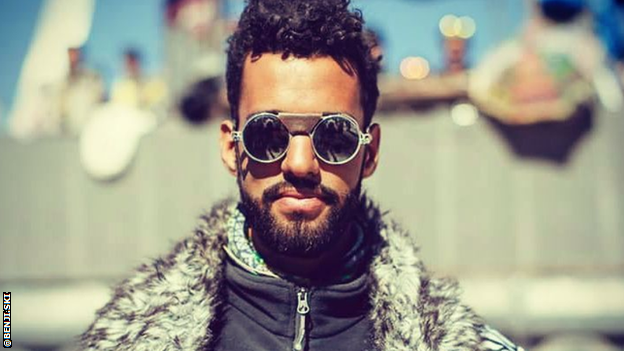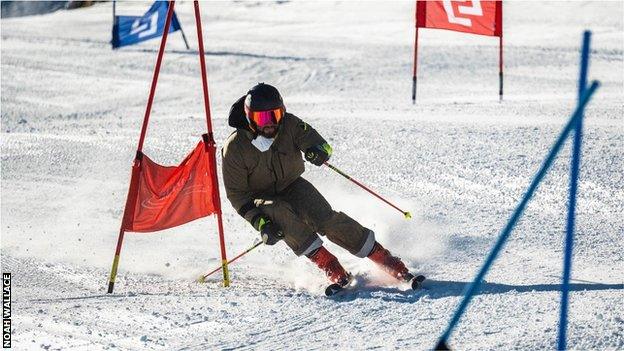Beijing 2022: Benjamin Alexander set to become Jamaica's first Alpine skier at Winter Olympics
- Published
Benjamin Alexander: The former DJ hoping to ski for Jamaica at the Winter Olympics
Benjamin Alexander's story tells of a life well lived.
Born in Northamptonshire, the engineering graduate had a short-lived career in finance before becoming a globe-trotting DJ. He's lived around the world, from the United States to Asia, and Beijing is set to be his next destination as he becomes Jamaica's first Alpine skier at the Winter Olympics, just six years after first trying the sport.
But the road to the Winter Olympics is one little travelled by Jamaica. Just 14 athletes from three sports have competed for the Caribbean nation at a winter Games. The most famous of those is the 1988 bobsleigh team immortalised by the film Cool Runnings.
Alexander watched that movie as a child. As the son of a Jamaican father and English mother, and with little Jamaican influence in his life other than the "food my grandmother would cook for me", he thought it was the "coolest thing since sliced bread".
Decades on, he counts the pilot of that bobsleigh, Dudley Stokes, as a mentor - their daily contact a vital help as he writes his own historic tale.
He acknowledges that without those pioneers, Jamaica might still not have competed in winter sports and his path to the Olympics would be "incredibly difficult".
"They say never meet your heroes, but Dudley is awesome," 38-year-old Alexander tells BBC Sport.
"There are many favours that I owe to those heroic efforts of the 1988 team. I'm designing my race suit and I would love it to be a close, 21st century version, of the bobsled [kit]. Credit where credit is due, the saying is we stand on the shoulders of giants and they were the giants in my story."

Alexander was a DJ at Burning Man in Nevada for 10 consecutive years, and worked in more than 30 countries
That story began in 2015. Alexander - a DJ at the Burning Man festival for 10 years who also had an Ibiza residency - had never skied before when he joined his friends on a trip to Canada. He was left astonished by the scenery. Skiing wasn't on his agenda that time but he knew he "wanted to do this".
An opportunity to do so presented itself a couple of months later when he was invited to DJ at a party in Whistler. He clipped into skis for the first time and it was all downhill, literally, from there.
"I just chose one green run [the easiest] and I just kept doing the same run over and over again," he says. "The first time I went on this run I think I fell 27 times. Great, that's my baseline. Let's see if I can improve that.
"I think I finished at the end of the day having fallen on that run only seven times and for me that was progress.
"That's just how I've looked at this entire thing. Chipping away one little bit at a time and trying to get better each day."
He went to the Pyeongchang 2018 Games as a fan, his own Olympic dream not even a thought at that point. But it was there that the seed was planted.
It was another year until that seed began to grow, a chance opportunity to learn from former US skier Gordon Gray giving him a steer in the right direction - and a reality check.
"He pulls me aside and he says, 'Benji, I'll tell you what I see. Your technique is absolutely atrocious, I've never seen anything worse'," says Alexander.
"'But you tell me you've only skied for 25 days, you've only had two lessons. Of course you don't just learn this highly technical thing by osmosis, but what I can't fathom for the life of me is how you're keeping up with me. You're a freaking lunatic, you're fearless. The fact that you're fearless means you have more than half the battle won.'
"He helped me understand that it would be within my reach if I truly applied myself and dedicated myself to it. I've been pretty much full-time on this mission since."

Benjamin Alexander hopes to compete in the giant slalom in Beijing
That was early 2019. Three years on, Alexander is getting ready to make his Olympic debut in the giant slalom after hitting the qualification standard to reach Beijing.
Qualification has been a tough battle, a positive Covid test over Christmas threatening to derail his attempt. But on Tuesday, at the inaugural Cape Verde National Ski Championships, held in Liechtenstein, he did it.
So how does a Caribbean athlete qualify for a Winter Olympics?
"The International Olympic Committee is trying to encourage as many countries to be participants and in as many different disciplines as possible. So they allow every country to put forward one B criteria athlete," says Alexander.
"It's not like I can just show my Jamaican passport and get a place. It's someone that just shows a level of professionalism. Most importantly, they're not going to kill themselves in front of a billion eyeballs on the TV screens, but are unlikely to compete for a medal.
"It's not a walk in the park. It's not the same as trying to compete against Dave Ryding for Team GB or trying to get onto the US or Swiss or Austrian team.
"They want to be very respectful to the fact that those guys are playing in a different ballpark. And then you have all of the other exotic nations, such as Jamaica and Ghana, that are participating with the hope that they can encourage more countries to get into that sport."
But Alexander's journey has become about so much more than his own individual goal - it's about what it represents.
"When I began this mission, it was really a selfish pursuit - let's see where I can take this for myself," Alexander says.
"Then after the incident that happened last year with George Floyd, I've received so much attention and support as a result of people trying to champion diversity in winter sports.
"Now, I almost feel like I carry this pressure to perform and to do this thing on my shoulders for diversity in winter sports, so it's become much bigger.
"I'm very excited to be that person that can show that it doesn't matter what your background is, socio-economic or race, you have a place in winter sports."

'We said we'd never talk about it': How a night out in Glasgow ended in heroics and then trauma for one man
Which players never got the credit they deserved? MOTD Top 10 debate the Premier League's unsung heroes
